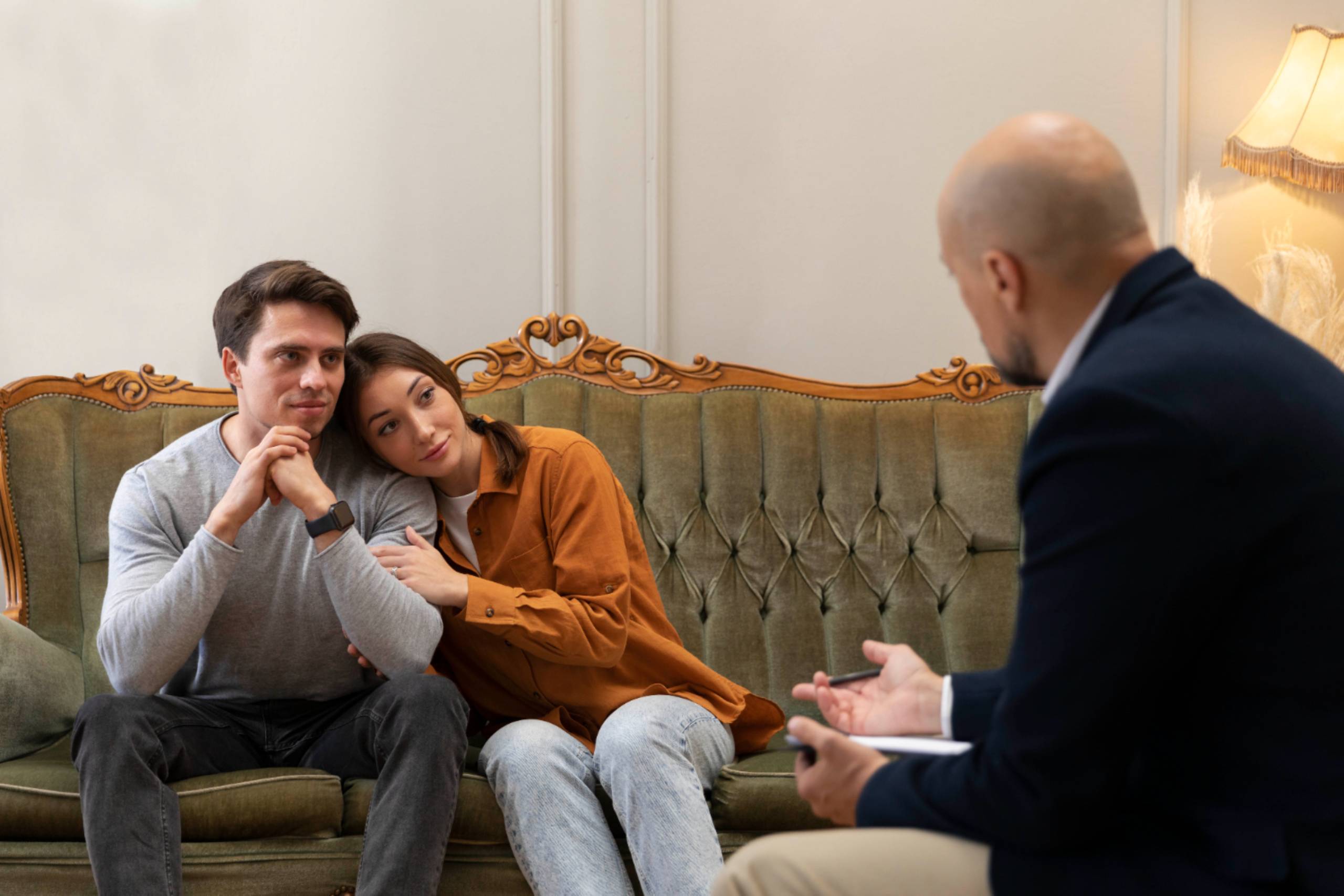How Long Does Marriage Counseling Last?
If you’re looking for numbers in regards to marriage counseling, it’s not one-size-fits-all. The number of sessions will depend on the couple’s unique dynamic. Many couples want to know how long it will take to see improvements in the relationship. Progress relies heavily on what each partner puts in, aka how committed they are to getting the most out of sessions, as well as doing things outside of sessions.
How Do You Know When It’s Time for Couples Counseling?
There’s no reason to wait for marriage counseling. Don’t hold off until your relationship becomes unhealthy. It’s like seeing a doctor for a checkup to take preventative measures to avoid getting sick. Why not take action to avoid problems instead of seeking help after things have gotten bad? In other words, marriage counseling can also be beneficial for relationships that both people feel are “good”.
But maybe you already feel like the marriage has gone off the tracks. In this case, it’s especially important not to wait to get marriage counseling. Here are some telltale signs your relationship needs help:
- You’re revisiting the same argument again and again
- You’re avoiding conversations and pretending everything is perfect
- You have intimacy issues or feel a lack of connection
- You had an experience of betrayal or a loss of trust
- One of you is considering a breakup or divorce
What Is the Average Length of Counseling Sessions, and How Often Do They Occur?
No two couples are the same. Since each couple has different needs, it is not universal. However, many couples have somewhere between 10 and 20 sessions in total. Weekly sessions are most common, at least initially. Research has shown weekly sessions to be most effective. This frequency strikes a balance between being able to create lasting change and not being too intense for people to manage. Each session usually lasts 50 minutes.
Later on, the sessions may become more spaced. Depending on progress, the couple might meet with their therapist bi-weekly or monthly. Even after immediate concerns are dealt with, some couples decide to continue with maintenance sessions less frequently ie. every few months. This can help to strengthen the connection, improve communication, and avoid future problems.
Marriage Counseling Durations
The duration of marriage counseling can differ based on the couple’s unique circumstances and goals. Here is a general breakdown:
Short-Term Counseling
For couples with minor issues, short-term counseling with a few sessions might be sufficient. Couples with smaller, specific issues might need 6 to 12 sessions over the course of 1 to 3 months.
Medium-Term Counseling
Most couples fall into the medium-term category, needing approximately 10-20 sessions to address moderate relationship problems.
Long-term Counseling
Couples with complex issues or deep-rooted problems may require longer-term counseling spanning several months or even years. These couples might be dealing with trust issues, infidelity, or deep emotional disconnects.
Factors That Influence the Duration:
- Type of Issues: If a couple is dealing with deep-rooted problems like trauma or feeling unsatisfied for a long period, they may need more sessions than those with surface-level conflicts.
- Commitment to Change: If both partners are fully engaged and committed to making changes, progress will be faster.
- Therapist’s Approach: A therapist’s approach and the type of therapy used can influence the duration of therapy sessions, with some modalities requiring longer sessions than others. Some therapists work in a structured, goal-oriented way, while others adopt a more flexible, open-ended approach.
How Long Should You Give Marriage Counseling?
Change doesn’t happen overnight, and this is especially true if there are deep-rooted problems in the relationship. Again, when you see results will depend on the individual relationship. For some couples, improvements could be seen in just a few sessions (aka a few weeks), if the issues are not well-established. However, it could take six months or longer before you see real change.
How Long To Try Marriage Counseling Before Divorce
As a marriage counselor, their role is to help both people determine what it is they want. They facilitate communication, and while they bring up the question of divorce, they won’t tell you to get one, or not. Their job is not to tell you whether or not you should stay together. You’ll have to come to that determination on your own. So what if you’ve been attending marriage counseling sessions, but things still aren’t moving in the right direction? There are a few things to consider before taking the next steps.
First, attending is not the same as participating. So it’s important to consider whether you (and your partner) are truly committed. In order for the counseling to “work” both people have to be motivated. This means you are willing to step outside your comfort zone and be vulnerable. You must be open to change. If a person is not emotionally ready or isn’t open to change, it will be hard to make progress.
For example, if your partner shows up but sits there with little to say, ie, just one-word answers, and refuses to participate in the exercises or do the homework, this is not much better than refusing to go to therapy. This is a sign that the relationship might not be salvageable.
Other reasons why marriage counseling isn’t going to work:
- One of you is involved romantically with someone else (without consent from your partner). This is a clear sign that one person is not willing to fix the relationship. If mending the marriage is important, cutting off ties with this other person is the first step. Until then, counseling is pointless.
- There is underlying abuse in the relationship. Any form of emotional, physical, or psychological abuse in the relationship should be dealt with in ways other than marriage counseling. Marriage counseling focuses on the relationship. The assumption here is that both partners have a (somewhat) equal role to play. However, in cases of abuse, the abuser is solely responsible for their actions. Therefore, marriage counseling is not an appropriate avenue. Abuse impacts safety. In many cases, therapy can make the abuse worse.
- There are unresolved personal issues. Marriage counseling might not be effective If one of you is struggling with unresolved personal issues (e.g., trauma, addiction, or mental health struggles) that haven’t been properly addressed first. Personal healing needs to happen before a relationship can be repaired. Independent therapy might be necessary before impactful change can come in the relationship.
- The marriage is beyond repair. Counseling cannot fix a relationship that is too far gone. If the couple is simply incompatible, one or both partners have checked out, or there is a significant amount of contempt, no amount of therapy will restore the connection.
It’s important to recognize when it’s the right time for therapy, and when other paths like a trial separation, divorce, or individual therapy might be better options.
What Percentage of Marriages Survive After Counseling?
While marriage counseling is not the antidote to divorce, it can help prevent it. There is research to confirm its effectiveness. Specifically, the American Psychological Association states that therapy is successful in restoring relationships 75 percent of the time. Studies have included couples of various backgrounds and those in high-stress situations. Therefore, we can conclude that couples therapy does work for a lot of people. And lately, there has been a rise in couples seeking outside help for their marriage. The divorce rate in the United States has been plummeting and marriage counseling is partly to thank for that.
Take the next step, and better your relationship. Begin working with an experienced marriage counselor that fits your needs.

 Call Us Now
Call Us Now



